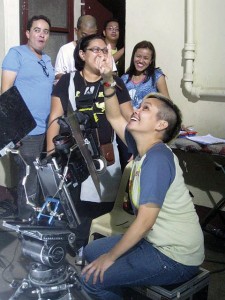Film editor-turned-filmmaker Tara Illenberger was “pleasantly surprised” to find that moving from indie to mainstream movies wasn’t that difficult.
“You hear things—about the lack of creative freedom,” she told Inquirer. “But Regal didn’t change a single thing in the script I wrote.”
In 2008, Tara won the special jury prize for her debut film, “Brutus: Ang Paglalakbay,” at the 2008 Cinemalaya festival.
For a follow-up, she made a thriller and entered it in the same indie fest two years ago. “I made it to the semi-finals but was eliminated,” she related.
As luck would have it, Regal picked up Illenberger’s script, which eventually became “Guni-Guni”—the story of a medical student (played by Lovi Poe) pushed to the edge of madness by recurring nightmares.
“It could’ve been an indie film, but now it’s in the mainstream,” the director said.
No barrier
Her point was that there should be no barrier between the commercial and indie sectors.
“The only differences may be in the budget and access to theatrical distribution, but in the end, cinema is cinema, stories are stories,” she said. “Regardless of the money and machinery, filmmakers invest blood, sweat and tears in every project.”
Old labels and preconceptions have become inaccurate, she pointed out.
The indie movement used to be equated with raw and rough, technically flawed movies. “Now, some indie films are more visually stunning and polished than some commercial movies.”
In the same way, mainstream movies were often dismissed as prosaic and formulaic in the past. “But now,” she said, “some so-called indie films can be complete sell-outs, too.”
Changing times
She elaborated: “Mainstream producers used to be scared of material that’s new and untested at the tills. They’re becoming interested in stories that are fresh and experimental.”
The mere fact that a Cinemalaya entry like “Guni-Guni” wound up in Regal proved her point, she said. “We see mainstream producers flocking to the Cinemalaya fest now.”
Expressing optimism, she said: “Young filmmakers hope that mainstream producers would burst out of their self-constructed boxes and gamble on projects that offer new perspectives.”
New spin
With “Guni-Guni,” Illenberger has put a fresh spin on horror, a genre that Regal has harnessed to the fullest with the “Shake, Rattle & Roll” franchise. “The living can commit more horrifying things than the dead,” she said. “There are more frightening things than ugly monsters.”
In this story that mixes the local tiyanak (demon child) legend with the prochoice/prolife hysteria, she played around with “the supernatural, psychological trauma and a dark, gothic atmosphere.”
Among her favorite horror flicks are Juan Antonio Bayona’s “Orfanato,” Alejandro Amenabar’s “The Others,” and Paul WS Anderson’s “Event Horizon.”
But Stanley Kubrick’s “The Shining” tops her list. “You can’t tell where insanity ends and the supernatural begins. It’s a nightmare that doesn’t stop. It was inspired by the photography of Diane Arbus, another artist I admire.”
She also loves the films of David Lynch, David Cronenberg and Maya Deren. “Their films have a dream-like, disturbing quality that haunts you long after you’ve turned off the DVD player.”
Online reports insinuated that “Guni-Guni” was copied from the Thai film “Alone.” “Only the posters are similar. I haven’t seen that film,” said Illenberger.
